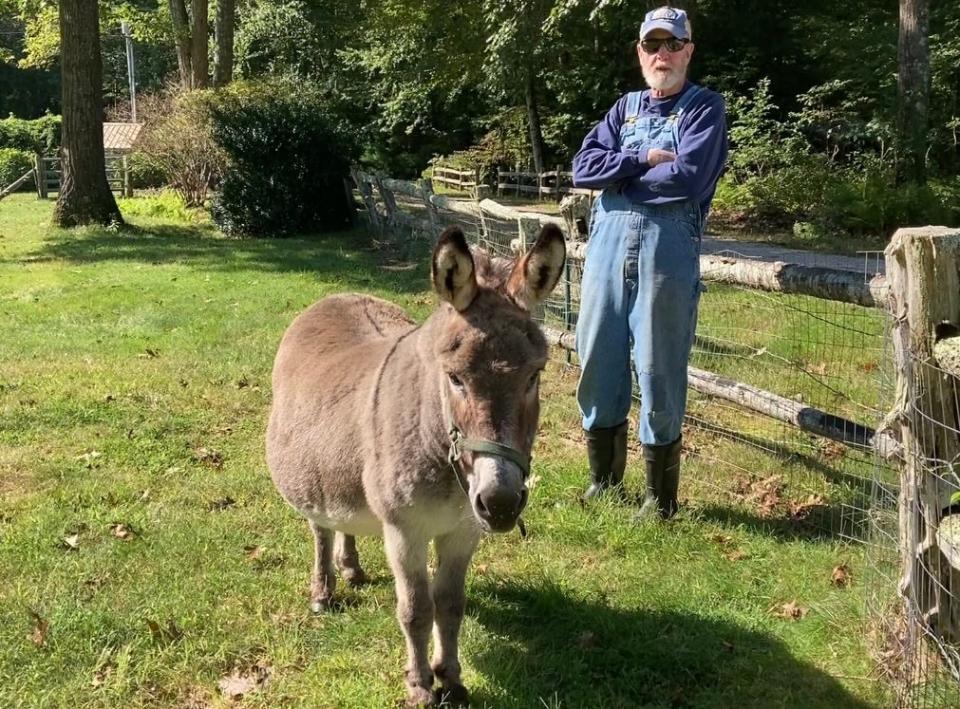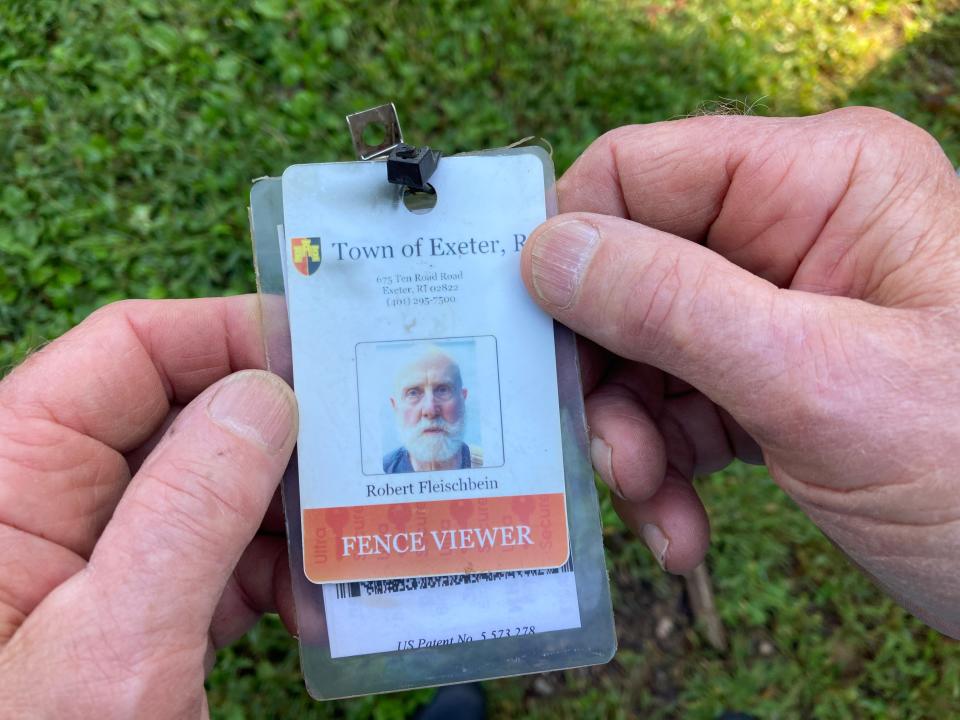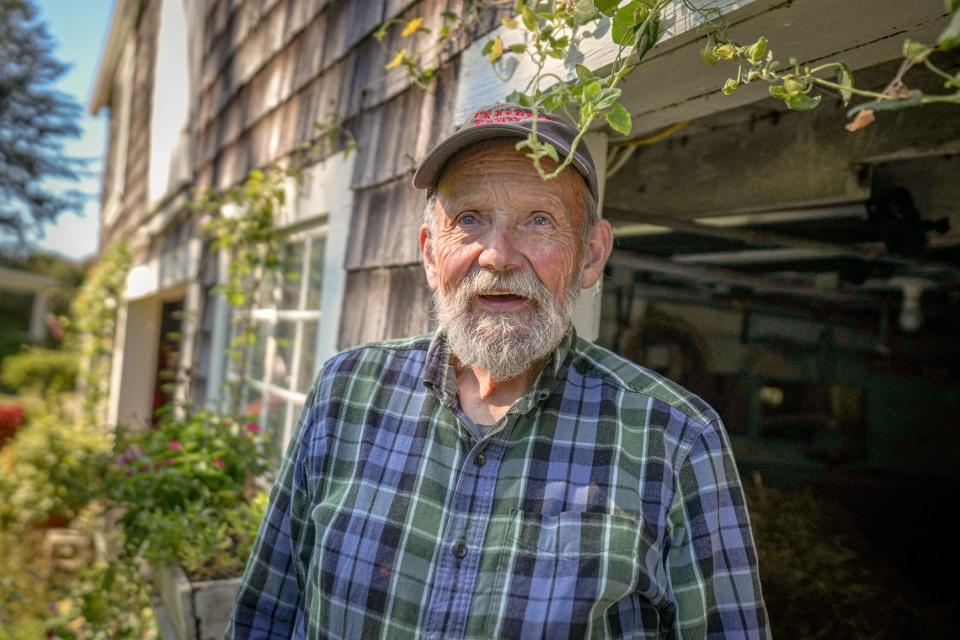Meet the fence viewer, Rhode Island's quaintest government position.
Earlier this month, Portsmouth appointed former councilman Andrew Kelly as the town's new fence viewer.
Yes, fence viewer.
Back in Colonial times, most Rhode Island towns had a "viewer of fences" whose job was to adjudicate boundary disputes. Portsmouth – along with Exeter, Foster, Hopkinton and New Shoreham – is one of the few that still do.
It's one of the most obscure positions in local government, and one that typically doesn't come with any pay or prestige. But people who take the job tend to hold on to it for decades.
Some see value in being able to act as a mediator between squabbling neighbors, even if they only get a couple of calls a year, at most. Others like being part of a lineage that goes all the way back to their town's beginnings.
"It’s a very historic, traditional position, and I want to make sure it keeps going," said Kelly, who at 32 is almost certainly the youngest fence viewer in the state.

A timeless source of conflict: Walls and fencelines
Back in the 1700s, the term "fence" typically referred to a stone wall, according to Thomas Thompson, who's served as Hopkinton's fence viewer for about 40 years.
Those walls were crucial for maintaining order because they kept animals out of cultivated areas. If one farmer's hogs wandered into another farmer's fields and ate all their squash, the winter ahead would be a difficult one.
The fence viewers made sure that walls were properly maintained and settled disputes about who was responsible for their upkeep. They also settled the inevitable disagreements about property lines that arose between neighbors.
Today, split-level ranches and sprawling suburbs have often taken the place of sheep paddocks and stone walls. But one thing hasn't changed: Fences and property boundaries are still a reliable source of conflict between neighbors.
"The fences may have changed, but the problems still exist," said Tom D'Agostino, who's been Foster's fence viewer since 2014.
D'Agostino recalled getting a call from one resident whose neighbor had built an 8-foot-6-inch "spite fence" that was leaning at a precarious angle and threatening to fall on his garage. He went and spoke with the neighbor, who complained that the man next door was "a pain in the butt."
Political Scene: They put their lives on hold to run for Congress. Now what?
"I said, 'You know, you guys should really resolve stuff with your neighbors,'" D'Agostino said. The next day, he heard back from the original caller: The two neighbors had worked out their differences, and the fence was getting cut down to a normal height.
"I was like, whoa, I should have been a psychologist," D'Agostino said.
D'Agostino isn't the only official in Foster with an old-fashioned title. The town also claims a corder of wood, Robert Thurber, and a keeper of the keys, Kevin Donovan.
Similarly, in New Shoreham, fence viewer Chris Blane doubles as the sealer of weights and measures. The island also has a corder of wood, Stanton Geer, and a packer of fish, Gary Hall.
Want to be a fence viewer? The job is (probably) all yours
The good news for anyone who wants to become a fence viewer: You don't need any particular qualifications, and you probably won't have any competition.
D’Agostino said that he semi-jokingly expressed interest in the job, thinking that he didn’t qualify because he doesn’t actually live in Foster. Seven months later, he got a call from someone who had a question about the placement of a fence.
"I said, 'Why are you are calling me?'" he recalled. "And they said, 'Well, you’re the fence viewer.'"
Robert Fleischbein, Exeter's fence viewer, also stumbled into the role.
One of his neighbors – "awful nice guy, self-employed, nice garden, delivered wood" – got into a spitting match with another neighbor. That second neighbor dumped a pile of loam on the property line, essentially creating a spite fence.

"So I went to the town hall, and I said to the girl at town hall, 'Who's the viewer of fences here?'" Fleischbein recalled. As it turned out, Exeter hadn't had one in quite a while. "She says, 'You want the job?' I said, 'Yeah, I'll take the job.'"
That was about 32 years ago. "Nothing has changed," said Fleischbein, who also volunteers with the local fire department. "Just instead of the little bungalows, now you’ve got million-dollar houses."
The bad news for aspiring fence viewers: Many towns eliminated the position at some point in the 20th century, if not earlier.
Some folded it into another town job. In Lincoln, Public Works Director Michael Gagnon is the fence viewer, while in Westerly, the building inspector automatically holds that title.
But in others, the role still technically exists – and just hasn't been filled for years. West Warwick, for instance, is now in its 20th year without a fence viewer, according to Town Clerk Sarah S. Rapose.
Richmond, similarly, has a long-standing vacancy. "I have been here since 2015 and nobody has applied during my tenure," Town Administrator Karen Pinch wrote in an email.
Defusing neighborly tensions with 'a little common sense'
Fence viewers aren't exactly inundated with calls.
D'Agostino once got four in a year; another time, he went two years without a single one. Thompson said he's received two so far this year, which is fairly typical. Overall, he said, he doesn't get as many calls as he did a decade ago.
"I don't really know why that is," he said.
Fleischbein, who gets a couple of calls a year, said that the rise of satellite imagery means there's less confusion about property lines than there used to be. When questions do come up, they're often the kind that need to be resolved by a professional surveyor.
So what's left for a fence viewer to do?
Fleischbein sees himself as a "go-between" between land owners and the Town Council. In one instance, a woman called because she thought her neighbor's fence was too close to the road. He went to town hall, got the plot plans, and showed her that the property just had a small setback.

He's also been able to act as the voice of reason, cautioning people to think twice before they launch into what would surely become an expensive and drawn-out court battle. (One such case involved people who built a fire pit on what was technically their neighbor's property.)
Often, the job involves defusing tensions "by using a little common sense," D'Agostino agreed.
He tries to appeal to people's better nature: When one caller asked if he was allowed to have the "ugly" side of his fence face his neighbor's house, D'Agostino explained that there was no law prohibiting him from doing so – it was just a matter of common courtesy.
But having the “ugly” hardware on the inside has an advantage, he added: “When you’re sitting there and hanging out with your friends, they can put their beers on it."
'Fence viewer' was once a patronage job
In the five remaining towns that have dedicated fence viewers, it’s strictly an unpaid volunteer position.
D'Agostino, Fleischbein and Thompson each noted that Rhode Island law allows a fence viewer to collect $6 a day from the parties involved in a dispute, but they'd never bothered to do so.
"I could ask for the six bucks, but what's the point?" D'Agostino said. "Just helping people, that's good enough for me."
As late as the mid-1990s, though, "viewer of fences" was a paid patronage position in Providence.

In 1986, The Journal profiled Adolph "Rudy" Marocco, a fence viewer who earned $1,000 a year in the part-time job that he'd scored because of his friendship with a city councilman.
"I get phone calls from doctors, retired judges, lawyers – you would not believe it," Marocco told The Journal. "It's amazing to see these intelligent people arguing over a fence."
Until fairly recently, North Providence also had a fence viewer on the payroll. Records show that the town allocated $2,000 for the position in fiscal year 2022, the last year before it was eliminated.
"We just don't need a fence viewer," said Mayor Charles A. Lombardi. "If I remember correctly, there wasn’t much for the fence viewer to do."
Frank Pontarelli was the last person to hold the job. Asked how he was chosen, Lombardi said that Pontarelli had been appointed before he took office. He said he believed that Pontarelli's family owned a fence company that had been around for a long time, and that Pontarelli had worked for that business.
"It wasn’t a political appointment," Lombardi said.
A reminder of rural, agricultural roots
In today's litigious world, the idea of calling a municipal fence viewer to settle disputes feels quaint.
And while fence viewers still have more responsibilities than, say, packers of fish, it's no coincidence that the role tends to attract history buffs.
D'Agostino, the author of books such as "Haunted Rhode Island," said that he enjoys being part of a tradition that's been around for as long as Foster has existed.
"It’s a cool job," he said. "I like it because it hearkens back to the very beginnings of Colonial America."
Thompson describes his role as "archaic." But he also sees it as a way to remind people that they're in a rural area.
"I thought it was important, from a historical point of view, to just keep the position filled and keep it going," he said. "I think it reminds people who we’ve been for all these years."
Kelly, Portsmouth's newly minted fence viewer, saw an opportunity to keep a centuries-old tradition alive while also helping to answer people's questions and resolve their dilemmas.
Portsmouth has a fairly small town government, he pointed out, so he'll be someone else residents can call.
In addition to the Town Council, Kelly previously served on the School Committee and water board, and he was recently appointed to the Zoning Board of Review. He applied to be the fence viewer because Portsmouth had gone more than a year without one – the longest gap in living memory, he said.
"Hopefully, people reach out to me," he said. "I'm ready to start working."
He's been reading up on the state statutes that outline the duties of a fence viewer and getting guidance from Philip Driscoll, who served as the town's fence viewer for about 15 years before stepping down. His predecessor didn't get many phone calls, he said, but that could always change.
"There’s a lot of construction in Portsmouth, a lot of people building houses, a lot of people building fences," Kelly said. "So maybe there will be an uptick, who knows."
This article originally appeared on The Providence Journal: Having a spat over your neighbor's fence? Call one of RI's fence viewers.

